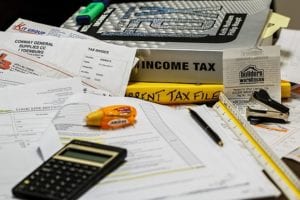
IRS agents are trained to tell the difference between basic mistakes and fraud!
Internal Revenue Service (IRS) agents are specifically trained to detect tax fraud. Now, more and more, the work is being done by computers so as to eliminate human error, but there are still thousands of IRS agents that conduct audits every year. It can seem very scary to someone who isn’t familiar with what they’re looking for, so we’re going to break it down for you.
What does the IRS look for in your taxes?
IRS agents are looking for signs of fraud, not simple mistakes. Mistakes happen all the time, and most IRS agents aren’t going to come after you because you miscalculated a number, or misunderstood a question on your income tax form. People often make mistakes when filing their tax returns, because tax forms can be complicated. The IRS knows and understands this.
What they are looking for is signs of fraud. Indicators that you are deliberately trying to cheat the government out of the money you owe them. Common examples of tax fraud are:
- Claiming dependents that you don’t have
- Deliberately underreporting income
- Keeping two different sets of financial records (sometimes called “cooking the books”)
- Using a fake or fraudulently obtained Social Security number
- Submitting false receipts to increase deductions
- Altering checks to increase deductions
- Claiming dependents
- Hiding assets
How does the government determine if it’s a mistake, or fraud?
If the IRS computer looks over your tax return and decides that the discrepancies are more than just mistakes, it will be flagged for audit. At that point an IRS agent will look through your tax returns and documentation, and determine if the error was a simple human screw-up, or a willful and intentional falsification. If it’s decided that fraud is the more likely answer, you will probably end up facing charges. But don’t worry, human error and everyday mistakes rarely result in tax fraud charges!
What happens if you’re accused of tax fraud in Michigan?
If the suspected falsification was on state or city taxes, it will be investigated by the Michigan Department of Treasury. If the suspected fraud was on your federal taxes, the IRS will investigate. Whether you face state or federal charges will be based on which taxes are suspect, and which agency does the investigation.
In Michigan, people caught cheating on their taxes face very serious charges. Failure to file a tax return, submitting a false tax return, payment with intent to defraud, aiding and abetting tax evasion, and filing false returns with intent to defraud are all felonies! Anyone convicted of these crimes could face up to five years in prison, and up to $5,000 in fines.
If you think you may be in trouble because of your tax returns…
Call The Kronzek Firm immediately at 866 766 5245. Tax law is very complex, and you’re going to need experienced help navigating the complex world of both the state and federal tax code. The skilled fraud defense attorneys at Kronzek Firm can assist you 24 hours a day, seven days a week, and can help you in your time of difficulty. Our defense team works with accountants, forensic accountant and economists to assist them when needed. We can help you too.





